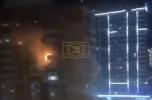אוקראינע צילט רוסישע אויל פאבריק, ציווילע ווערן פארוואונדעט.


A coordinated drone strike by Ukrainian forces targeted Novorossiysk, a key southern Russian port, causing damage to both commercial infrastructure and civilian residences. Social media footage shows debris from the attack hitting two apartment buildings, scorching upper-floor units and sending four local residents to the hospital with shrapnel injuries. No fatalities were reported in the residential damage, though the broader operation across southern Russia resulted in three deaths and 16 injuries.
Ukraine’s Security Service claimed responsibility for the strike, which focused on the Caspian Pipeline Consortium's oil facility and a Russian vessel, effectively halting loadings at the strategically important energy export hub. The operation highlights Ukraine’s ability to reach deep into Russian territory, targeting critical economic and military infrastructure, while the unintended residential damage underscores the ongoing risks to civilians on both sides of the conflict.
Russian air defenses intercepted many of the incoming drones, yet fragments from intercepted devices reportedly caused the harm to nearby apartments. The incident has sparked debates over the effectiveness of Russian defense systems and raised concerns about the growing vulnerability of civilian areas in both Ukraine and Russia as the war enters its fourth year.
Observers note that this attack illustrates the increasingly complex and high-stakes nature of modern warfare, where precision strikes are accompanied by unavoidable risks to non-combatants. As Ukraine continues to leverage drone technology for strategic purposes, the potential for collateral damage remains a critical issue for both humanitarian observers and military planners.
The Novorossiysk raid is likely to intensify discussions on regional security, civilian protection, and the challenges of defending key energy infrastructure amid a prolonged and high-intensity conflict. Both nations continue to grapple with the implications for local populations, highlighting the persistent dangers faced by communities caught in the crossfire.
גאלערי
ווידעאס